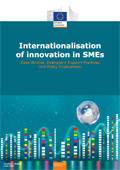Internationalisation of innovation in SMEs: Case Studies, Exemplary Support Practices and Policy Implications

date: 25/08/2016
EUR-Lex Link: bookshop.europa.eu/en/internationalisati...
author: Stefan Lilischkis, Jza Abbas, Robbin te Velde and Leonique Korlaar
Contact: Samuël Maenhout
This publication focuses on the combination of two subjects – innovation and internationalisation – which are deemed to be crucial for the European economy. It has two key parts: (1) twelve case studies of innovative SMEs with insightful international activity and (2) an analysis of strengths, weaknesses, opportunities and threats (SWOT) of European policy measures and infrastructure seeking to enhance such internationalisation.
The case studies show that there are many different combinations of types of internationalising innovation, and no dominant scheme. Reaching a sufficient number of customers was found to be the principal driver for internationalisation. The case SMEs use a variety of public support measures for internationalising their innovation activities; European research projects seem to be a prominent way. All case SMEs report positive impacts of internationalisation.
A SWOT analysis shows that the main strengths of European policies for supporting SMEs’ international activity is the diversity of instruments, their accessibility for all sorts of SMEs, and the clear focus of Horizon 2020 on transnational research, development and innovation cooperation and exchange as a stepping stone towards greater competitiveness on the global scene. However, a weakness is that many coordination and support policy measures that support internationalisation of SMEs focus primarily on export and trade promotion, without necessarily stimulating SMEs’ internationalisation of innovation activities.
The study identified four principal challenges when internationalising innovation: having to stay at the top end of international technological and knowledge development; establishing contacts to foreign countries; dealing with foreign cultures; and dealing with governmental policy, regulation in particular. Dedicated national and European policy measures may help in tackling these challenges.
